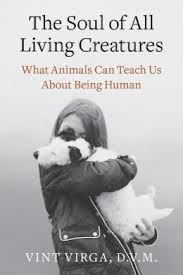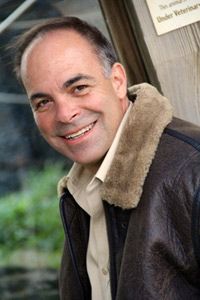 Two of the most exciting parts of my work are when a client gets a publishing offer for their book and when a client gets recognized for the amazing work they are doing. Both of those things happened this week. While, I can’t reveal the publishing offer before the contract is signed, I can share Dr. Vint Virga‘s New York Times debut.
Two of the most exciting parts of my work are when a client gets a publishing offer for their book and when a client gets recognized for the amazing work they are doing. Both of those things happened this week. While, I can’t reveal the publishing offer before the contract is signed, I can share Dr. Vint Virga‘s New York Times debut.
Vet Behaviorist Dr. Vint Virga, author of The Soul of All Living Creatures, which won a Nautilus Award in May, is featured for his work in today’s Sunday New York Times Magazine and you can read it here.
The Times featured a digital version of the article on their home page this week, along with a moving video about Dr. Virga’s observations of three different animals–a giraffe with an eating problem, a sea lion having an eye exam and a tegu learning to climb through a tunnel.
I asked Vint to share a bit of the magic with us, as well as his insights on writing.
Me: Congratulations on this extraordinary feature in the New York Times Magazine, along with the digital enhanced digital coverage that includes a moving video about your work with animals at the Roger Williams Park Zoo. How did the piece come about?

Vint: I first met Alex during the course of my first fellowship at MacDowell. At dinnertimes and evening readings, as we talked about and shared our books, Alex took a keen interest in my work with animals. Once we returned from New Hampshire to our routine lives, Alex approached me with his concept for the story. Roger Williams Park Zoo graciously allowed him to join me on my routine rounds to view the animals in their environments and watch their wonderful commitment to animals in action.
Me: Did you use some of the same observational, scientific and intuitive skills you use when observing animals in writing your book? Or did you have to turn off aspects of the more scientific brain to write at times?
Vint: I found writing my first book a fascinating struggle of learning how to set aside my inner critic (which is constantly nagging) and the scientist inside of me (which is always questioning and second-guessing) to allow the creative side of me to flow.
When writing each chapter and again in revisions, I would make a deal with myself not to edit too much while I was writing, so the creative side of my brain could flow. Still, consistently my writing is guided by the same voice and perspective I bring to my work with animals — watching and noticing and trusting my instincts.
___________
Vint shared three of the most powerful skills for writing–paying attention, making observations and tapping into instinct and intuition–listening within.
Dear Reader, are there skills you use in your work that you either need to turn off for writing, or that help you be a better writer? Please share your comments below.

